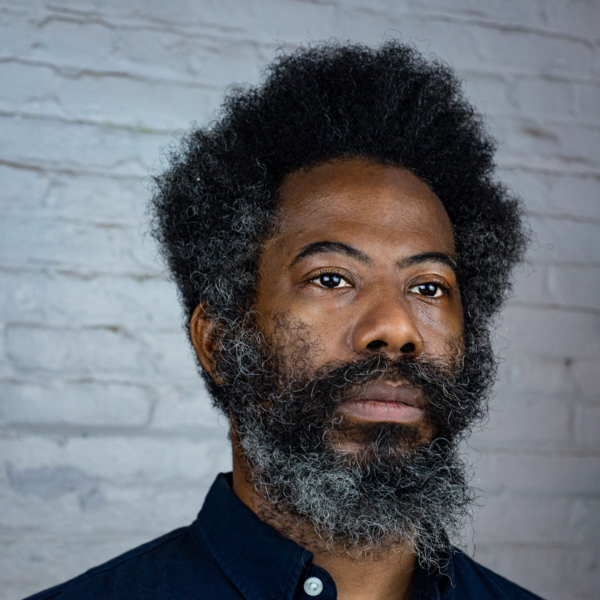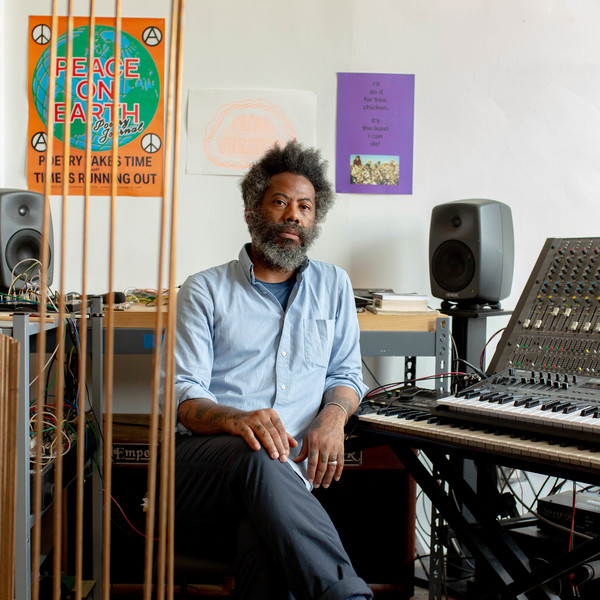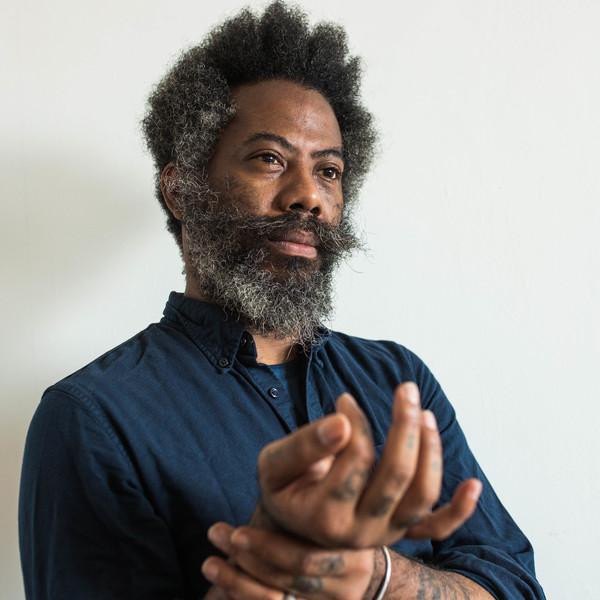Robert Aiki Aubrey Lowe
Location
- Brooklyn, NY
Artist Biography
Robert Aiki Aubrey Lowe (b. 1975) is an artist, curator and composer that works primarily with, but not limited to voice and modular synthesizer for sound in the realm of spontaneous music. Along with analog video synthesis works, he has brought forth an A/V proposal that has been a focus of live performance and installation/exhibition.
The marriage of synthesis and the voice has allowed for a heightened physicality in the way of ecstatic music, both in a live setting and recorded. The sensitivity of analogue modular synthesis echoes the organic nature of vocal expression which in this case is meant to put forth a trancelike state.
Lowe’s works on paper tend towards human relations to the natural/magical world and the repetition of motifs.
As of late Robert has also put more focus on composition for film, both in solo scoring and collaboration. Over the last several years Robert has collaborated on projects or provided sound in a featured artist capacity for such films as End of Summer, Sicario, Arrival, Last and First Men with Johann Johannsson and It Comes at Night with Brian McOmber. Recently Robert has scored Il colpo del cane for Fulvio Risuleo, Candyman for Nia DaCosta, The Color of Care for Yance Ford and Master for Mariama Diallo.
On the subject of film, each score is meant to have a very specific voice and sonic palette, so each project is approached with clear intention. Creating a unique signature in composition and instrumentation for each is film is always most important.
Through collaboration Robert has worked with Ben Russell, Ben Rivers, Sabrina Ratté, Rose Lazar, Nicolas Becker, Jóhann Jóhannsson, Tarek Atoui, Hildur Guđnadóttir, Philippe Parreno, Evan Calder Williams, Ariel Kalma, Susie Ibarra, YoshimiO, Alexandra Wolkowicz, Biba Bell, ADULT., and Rose Kallal, as well as many others.
The marriage of synthesis and the voice has allowed for a heightened physicality in the way of ecstatic music, both in a live setting and recorded. The sensitivity of analogue modular synthesis echoes the organic nature of vocal expression which in this case is meant to put forth a trancelike state.
Lowe’s works on paper tend towards human relations to the natural/magical world and the repetition of motifs.
As of late Robert has also put more focus on composition for film, both in solo scoring and collaboration. Over the last several years Robert has collaborated on projects or provided sound in a featured artist capacity for such films as End of Summer, Sicario, Arrival, Last and First Men with Johann Johannsson and It Comes at Night with Brian McOmber. Recently Robert has scored Il colpo del cane for Fulvio Risuleo, Candyman for Nia DaCosta, The Color of Care for Yance Ford and Master for Mariama Diallo.
On the subject of film, each score is meant to have a very specific voice and sonic palette, so each project is approached with clear intention. Creating a unique signature in composition and instrumentation for each is film is always most important.
Through collaboration Robert has worked with Ben Russell, Ben Rivers, Sabrina Ratté, Rose Lazar, Nicolas Becker, Jóhann Jóhannsson, Tarek Atoui, Hildur Guđnadóttir, Philippe Parreno, Evan Calder Williams, Ariel Kalma, Susie Ibarra, YoshimiO, Alexandra Wolkowicz, Biba Bell, ADULT., and Rose Kallal, as well as many others.
Selected Press
He sought to sonically Xerox the film through an uncanny acoustic equivalent of an "all seeing eye." Movements in the broader symphony of Lowe's score ambiently lavish the ears of viewers, while also carrying an unsettling undertone. Buried auditory passageways embedded deep inside of his tense, suspended collision of vocal and orchestral textures mimic and build upon the call-and-response tradition in African-American music that can be traced from sacred hymnals to the secular work songs that inform the 20th century continuum of the blues, jazz and soul.
DeForrest Brown Jr. on the score of CANDYMAN for NPR
New York’s Museum of Arts and Design commissioned polymath composer/vocalist/drone metal artist Robert Aiki Aubrey Lowe to respond to a Bertoia exhibition and gave him full access to the barn, he came up with a stunningly immersive album in which he weaves through the sculptures and makes them throb, shimmer and sing. He sings himself, too, high and eerie, and the effect is ghostly and lush, untethered and earthbound. Bertoia himself made plenty of recording with these sculptures but Lowe makes them, and the space, his own.
Kate Molleson on Levitation Praxis pt. 4 for the Guardian
Some artists find their voice, and spend their career perfecting it. There are others, however, that can spend an entire lifetime in continual transition. Robert Aiki Aubrey Lowe is firmly of the latter ilk.
Tristan Bath interview for the Quietus
A considerable part of the first film’s power was the trance-like seduction of Philip Glass’ original score. Composer Robert Aiki Aubrey Lowe’s textured music has its own atmospheric hold, mixing synth and strings with ambient drone and choral elements.
David Rooney on Candyman score for the Hollywood Reporter
He’s very much the adventurer, just happy to explore the myriad of evolving possibilities the modular world has to offer. Hypnotically pulling you around in honeycombing regals and pointy prismics, the glitter of alien worlds held in the amber of a quantised melody.
Michael Rodham Heaps on Two Orb Reel for FREQ
Admirers of classical composers like Bartok or Penderecki at their most atonally and aggressively avant-garde may glean something from it.
Jonathan Broxton Candyman score review for Movie Music UK


